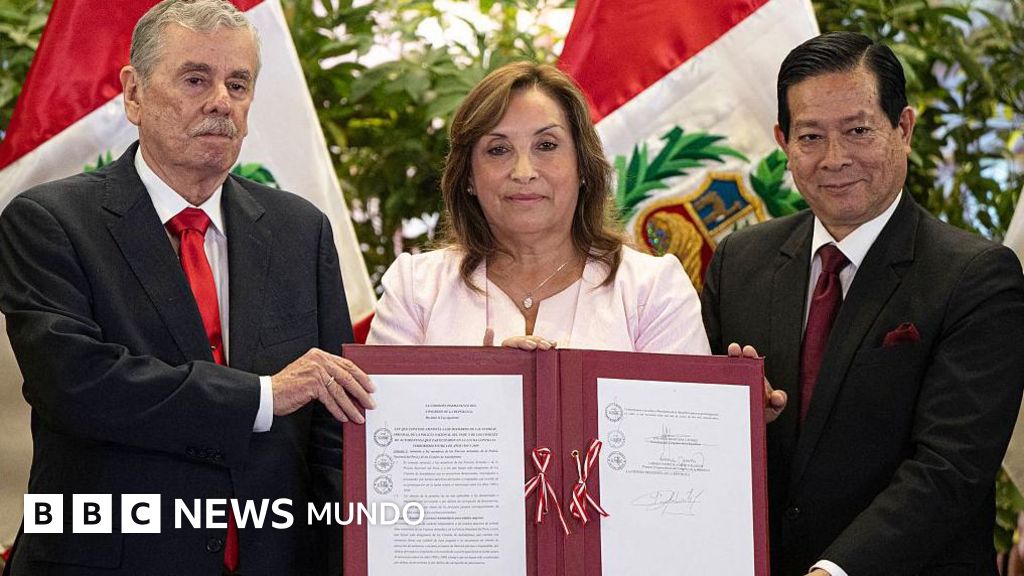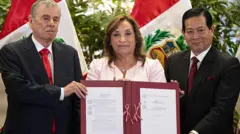

Image source, Getty Images
-
- Author, Guillermo D. Olmo
- Author's title, BBC News World
- X,
The crimes committed during the internal armed conflict continue to place and generate controversy in Peru.
President Dina Boluarte promulgated on Wednesday a law that amnesty the military, police and members of the Self -Defense Committees prosecuted for crimes against human rights committed during the war that faced the Peruvian State and the ultra -left guerrillas of the Shining Path and the Tupac Amaru Revolutionary Movement (MRTA) between 1980 and 2000.
In a solemn act in the Government Palace of Lima in which it was accompanied by the deputies who promoted their approval and high authorities, Boluarte signed a law that, he said, does “justice” and “honor” those who fought against “terrorism.”
“Many of these men and women delivered their lives in defense of the peace that we enjoy today. Others survived, but charged for years with the weight of endless judgments, of unfair accusations, of a pain that not only reached them, but also their families,” he said.
With the law, said the president, “let's return the dignity that should never be questioned.”
The law unleashed the indignation of the relatives of the victims.
“The Law rewards human rights rapists and closes the investigations still ongoing,” denounced Gisela Ortiz, spokesman for the victims of the killing of the Cantuta of 1992, in which members of the Intelligence and Police Service kidnapped and murdered ten people at a university around Lima.
Teófila Ochoa, survivor of the massacre of 69 people from an indigenous community perpetrated by a military patrol in Accomarca in August 1985, said that it “hurts as Peruvian” that laws are approved so that “the murderers who have burned, killed and violated our relatives are free.”
Tania Pariona, from the Human Rights Coordinator, a local organization, told BBC Mundo that “amnesty seeks to impose a policy of forced forgetfulness about the events between 1980 and 2000, when there are families that have been waiting for decades waiting to receive justice.”
The measure has also been questioned outside Peru.
A group of independent experts from the United Nations Human Rights Council warned that the approval of the amnesty would put the Peruvian state “clearly breach of their obligations under international law”, whose norms “prohibit amnesties or pardons for such serious crimes.”
And the president of the Inter -American Court of Human Rights (IACHR), Nancy Hernández López, required the Peruvian State to suspend the processing of the controversial law until the Regional Court analyzes how it affects its content to the victims of the Matanzas de Barrios Altos and La Cantuta, two of the most prominent of those years and for which the then President Alberto Fujimori was convicted.
The Peruvian conflict left about 70,000 dead, 30% caused by state agents, according to the final report of the Truth and Reconciliation Commission.
Who benefits the amnesty
The amnesty norm to the members of the Armed Forces and the National Police of Peru “who are denounced, investigated or processed by derived criminal acts or originated on the occasion of their participation in the fight against terrorism between the 1980s and 2000s.”
The members of these organizations that have already been convicted will enjoy the amnesty if they have turned 70, which, according to victims organizations, will allow, given the time elapsed, they all leave prison or remain without punishment.
The norm also benefits the militiamen of the self -defense committees, a kind of citizen patrols that proliferated during the conflict in the areas with a lower presence of the state forces.
Among the potential benefited by the measure are military commanders who have eluded the action of justice, such as General José Valdivia Dueñas, who sent the forces that in May 1988 ended the lives of 29 people in Cayara, Ayacucho.
Others, such as Santiago Martín Rivas, imprisoned for leading the so -called Colina Group, the command that perpetrated the Matanzas de Barrios Altos and La Cantuta, could leave prison without having fulfilled their sentence or compensated to the victims.
Another that could be released is Telmo Hurtado, an ex -military known as the “butcher of the Andes”, sentenced in 2016 to 23 years in prison for directing the Matanza de Accomarca.
“There is no official figure, but we are certain of at least 156 cases with a final sentence and 600 in process that would be canceled,” said Pariona, of the National Human Rights Coordinator.

Image source, Getty Images
Amnesty's law was approved with the votes of Popular Force, led by Keiko Fujimori, daughter of former president Fujimori, convicted of crimes against human rights and corruption crimes committed during his mandate.
Other right -wing congressmen voted in favor, including the retired Admiral Jorge Montoya, who wrote the project and complained because “more than 1,200 families” of police and military have suffered for years the prosecutor's calls to their loved ones.
Fujimorist Fernando Rospigliosi, defender of the law, said that justice is done to “who with courage and love of the homeland” faced “terrorism.”

Image source, Getty Images
What can happen now
Victims organizations have initiated protests and legal measures to prevent the application of amnesty.
They have their hopes on the IACHR, which has proved them other times.
The president of this International Court has summoned the relatives of the victims of Altos and Cantuta to a public hearing on the subject on August 21, which has also cited the Peruvian State.
But Peru has already ignored some of its resolutions since Dina Boluarte is president, such as when she released Fujimori by virtue of a controversial pardon that the Court considered illegal.
Weeks before signing the law, Boluarte proclaimed that “Peru is not a colony of anyone.”
“We will not allow court intervention,” he promised.

Image source, Getty Images
However, there are voices that argue that it will be the judges who finally decide in each case if the amnesty is applied.
They maintain that the law is unconstitutional and broken the commitments acquired by Peru as a signature of the American Human Rights Convention, so they could apply the legal principle known as “diffuse constitutionality” or “conventionality” control, which allows a judge to stop applying in a case of its competence a rule that seems contrary to the Peruvian Constitution or the aforementioned Convention.
According to Omar Cairo, professor of constitutional law of the Pontifical Catholic University of Peru, “all Peruvian judges, by mandate of article 138 of the Constitution, have the duty to inapplicate the law of amnesty.”
David Lovatón, legal advisor to DPLF, an organization dedicated to the defense of human rights and the rule of law in Latin America, predicts that “certainly the military, police and civilians investigated, processed or condemned by serious human rights violations will require the application of this law in the respective fiscal folders or judicial processes, but it will correspond to the judges to evaluate whether it proceeds – or not. order “.
Lovatón believes that “this new amnesty law is clearly incompatible with the American Convention in the light of the sustained jurisprudence of the Inter -American Court based on the Case of Barrios Altos Vs. Peru of the year 2001, which has banned in our continent any state norm or measure as amnesties, pardons or prescriptions, which pretend the impunity of serious human rights violations.”
Most likely, the legal controversy on the crimes committed in the Peruvian conflict will continue, a new example that they still suppurate wounds that the country has trouble closing.

Subscribe here To our new newsletter to receive every Friday a selection of our best content of the week.
And remember that you can receive notifications in our app. Download the latest version and act.





